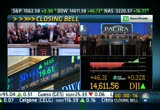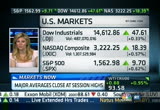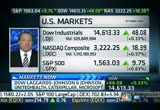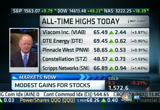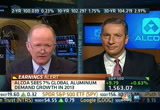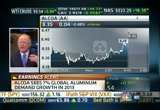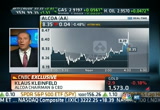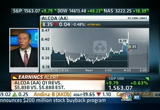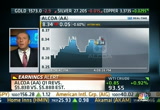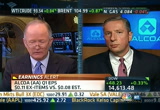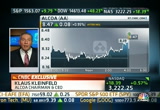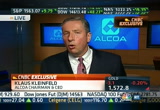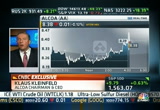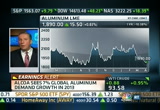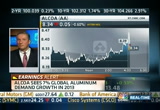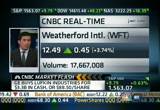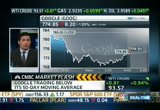tv Closing Bell With Maria Bartiromo CNBC April 8, 2013 4:00pm-5:00pm EDT
4:00 pm
four months. it's definitely the fed. >> all right. we got that. and we got alcoa coming out with earnings here in just a few minutes. the expectations for 11 cent profit on revenue of $5.8 billion. we'll have that number coming up in just a moment. my thanks to the entire costa family. that is the first hour of the "closing bell." let's get started now with the second hour and get ready for the ceo of alcoa. welcome back to the "closing bell," everybody. i'm mandy drury. maria bartiromo will be back tomorrow. in the meantime, look at that. stocks staging another big comeback in the final hour of trading. it's as if the jobs number and all its nastiness just never happened. now we are turning our eyes to alcoa. that is kicking off earnings season in just a moment's time. in the meantime, let's take a look at these numbers. of course, we're just certainly digesting the final day's trade. this is how we are finishing up. the dow up by 47 points. the day's highs there after
4:01 pm
being down by 67 points. same story for the nasdaq and s&p 500. pul pulls themselves out of red and finishing up by .6% indices. just minutes away from alcoa's first quarter earnings report. first, maggie patell. also david kudler from mainstay capital management. david, what do you make of this comeback? is this a trend we're going to continue to see? >> well, it's -- it's really a pattern that we've seen since the election. we have these reasons for the market to sell off. whether it's cyprus, whether it is a jobs number. but we haven't had more than a 3% selloff since the election. so as soon as the market comes down 1% or 2%, those buyers come in. it's a pattern that we see repeat. eventually we'll get that 5% to 10% correction. but so far the buyers just keep
4:02 pm
coming in. the people on the sidelines waiting to come into this market. >> as that happens and finally after the jobs number on friday, the yield on the 10-year headed lower, we're down to 1.70. i haven't seen what it was in the last half hour as the markets come back here. do you think it will continue lower? we hit that all-time low of the 10-year at 1.38 last july. you think we'd be heading that low even as this market continues higher? >> i think we have good chance of testing those lows again. because usually we think of low rates as a sign of a weak economy. but the other side of the coin is with other economies weak, money is drawn to the u.s. dollar, forcing down treasury rates. i think treasure is might have lower yields. >> to what extent, margie, do you feel keeping these rates low is going to help the economy get a bit of a boost to be back up to the upside in the second half of the year? >> i don't think we've really gotten a lot of help from these -- these policies that the fed has pursued.
4:03 pm
i think it's just that natural rejuvenation of the u.s. economy bouncing back after a very deep recession. i think the economy has all the pieces in place to continue to grow at a relatively modest rate. we've had a little bit of help because these rates have helped housing pick up a little earlier. but i think basically it's just that u.s. economy just rolling along and growing the way we always like it to do. >> david, i know this oversimplifies things. but do fundamentals really matter right now when you've got the fed backstopping us? i think about the jobs report. i think about the geopolitical concerns that are out there. i think about the japanese, you know, supporting their economy and pushing their own yen down, which is not great for our economy and our exports. but yet our market just continues to go higher. so do the fundamentals even matter right now? >> fundamentals matter. they matter in the long term. but central bank easing, not just here but around the world, as you mentioned, has been an
4:04 pm
underlying support for this market. and that's -- just talked about bond yields being lower. that's driven by by an outside factor right now with the boj. >> i got to interrupt you here right now. i'm sorry. i apologize. the alcoa numbers we've all been waiting for are out right now. you can see ail cohlcoa's share creeping higher. they came in, met the whisper number we mentioned before of 11 cents. that came to us from whispernumber. whispernumber.com. revenue was at $5.83 billion. to put a fine point on it, the market was looking for $5.88 billion. once again, per tradition we welcome chair and ceo klaus kleinfeld who joins us now exclusively to go over these numbers. good to see you again. welcome back. >> hello, bill. good to be with you. >> give us just a broad outlook. we want to talk about some specific fundamentals that are facing your company right now. but give us your sense of how
4:05 pm
the past three months went for your company. >> well, bill, it's a good start into the new year. i mean, it's a solid, good quarter. and let me say three things that i see in this quarter. number one, i mean, we've been focusing on building out our value add businesses. and you can see that now in this quarter, 72% of our profits come from our value add businesses. number two, you see a remarkable performance from our hot stream business, defying all the elements like lower metal prices. very good. number three, a very, very good performance on the cash side. so those are the three things that i see in this quarter. and i'm very happy about it. >> let me focus on the upstream business as you put it. because that's what everybody identifies with. they see the price of aluminum going down worldwide. there's an overcapacity. you're trying to cut production to meet that. give us a sense of where that goes from here. what kind of guidance are you
4:06 pm
providing for that very important part of your business right now? >> well, look, we are focusing on the things that we can control, not on those ones that we can't control. we have on the upstream side been continuing to bring our cost position down. that's why you are seeing that even in this current environment, the upstream is performing very well. but what is really important here is that alcoa has moved on. we are very strong now in the value add business. as i just said, 72% of the profits come from our value add businesses. the downstream businesses are hitting another record. we now have over 20% profitability in that business. midstream is doing very, very well. so this is what we are doing today. and this is how we are rebuilding the company into something that is less dependent on metal price swings and much, much more things that we can control ourselves that we have in our hands. >> you know, there's been talk that maybe you would think about selling your raw aluminum
4:07 pm
business. is that part of the strategy? >> well, look, we are there to create value. and we are creating value with the strategy that we have. and the strategy is very clear. build out our value add businesses, and we are doing that. through all the things that we can bring in from alcoa, lots of innovation. and you can see that resulting in better numbers. at the same time, we are making the upstream business better by a whole host of reasons. curtailing high cost capacity. bringing new capacity on that is lowest cost. build in saudi arabia. lowest costs on this planet. will bring down refining as well as 2 percentage points on the cost curve. that's a big deal. it's going very well over there. >> forgive me, but are you thinking about selling your raw materials business, raw aluminum business? that was the question. >> look, i mean, this is not -- this is not the time to speculate. our strategy is working. this is a great day that shows this. that's what we're sticking to. >> let me ask you about what's going on in japan, for example.
4:08 pm
we know worldwide there is a -- what's called a race to the bottom in the currency markets as central banks and other governments try to revive their economies, reflate their economies, stem the problems of deflation by devaluing their various currencies. japan is just the latest example of that. that can't be good for a multinational company like yours. how much does the currency risk affect your bottom line going forward? >> when you look at how we are positioned, we are positioned in a lot of different end markets. and many of those end markets show remarkably strong growth patterns. when you look at aerospace here in the u.s., automotive in the u.s. as well as -- the whole industry is alum nizing. building and construction in the u.s. is coming back. china is performing st ining st. even europe, every other week we continue to see a crisis, from cyprus to elections in italy,
4:09 pm
but when you look at a very sensitive indicator, the 10-year bond rate, it's basically not moving. it's sitting there at a very nice place. you see that europe is relatively resilient and is muddling through. so i think that that's the environment that we have. i'm relatively optimistic that 2013 is going to be better than 2012. we actually see a recovery in the u.s. on the building and construction side. all of those are markets that we cater to. so for us, we continue to project 7% demand growth in aluminum. these are the things that count for us. >> let me ask you, then, kind of break it down for us. those areas of the world economy where you are most encouraged, where that demand that would fuel the 7% gains you see this year, but what areas are you most concerned about? where do you see slowdown in demand around the world? >> if i look at the u.s., to start with, the regional u.s., i'm relatively optimistic that u.s. is growing nicely.
4:10 pm
we see in those very important markets not just for us but for the u.s., aerospace. we see 9% to 10% growth in aerospace. an eight-year backlog. that's a very important market for us. that's a very important industry for the u.s. because it's high value. automotive in the u.s. the numbers that recently came out show it's continuing to go in the right direction. plus the whole industry is going for lightweighting and alum nizing. great for us. building and construction, a large block for the u.s. economy. finally after many years of a disastrous situation, it's coming back. it's clearly coming back. all indicators are showing forward. go through all the segments in the u.s. that's nice. just a little bit more than a week ago i was in china. and i have not run into anybody there who had a growth rate that was below 7.8% projected for this year. in essence, the projection are 8.2% gdp growth for this year. then you go to europe. you can talk about europe endlessly but in reality we have
4:11 pm
to admit muddling through is almost a lifestyle in europe. they are pretty good with that. that's what we're seeing over there. that's also what's reflected in the view of the market. so this -- this basically leads us to come to reaffirming we see 7% demand growth in aluminum because typically it's much ahead of the gdp growth. >> i know you're working on this $11 billion mining, smelting and rolling complex in saudi arabia. which will be the world's cheapest to operate. how is that going? can you update us on that project and how important it is to your business? >> yes. that is actually going very, very well. on the 12/12/12, so 12th of december, 12:00, we actually had our first metal that we produced there. ahead of our schedule. below budget. that's fantastic. and we are moving -- we are continuing to move on. the importance of this project is it's the lowest cost on this planet. and each one of the -- integrated from mining,
4:12 pm
refining, smelting to lowing. all of this is in there. it's basically totally on plan. it's going to bring down our upstream business by two percentage points on the cost curve. meaning refining and smelting is going to come down 2 percentage points on the cost curve. and we also have a downstream business there. in fact, we will roll off the first metal coil there by the end of this year. on the rolling mill. we have started an automotive project there also on the 12th of december last year which will produce automotive capacity, catering not only to the middle east and africa but also having the capability to go into europe. all of that is very, very exciting. just give you one factoid. we've just completed mid of march to pour the tank farm concrete. and it was a pour that lasted for three days continuously. >> wow. >> 600 concrete trucks were involved in that. just imagine the logistical challenge that you have to go
4:13 pm
through. if you were to do it here in this environment, now imagine this is all an area where basically it's sand. >> i'd love to have that concrete contract in that particular case. before you go, let me ask you, i know you have no control over it as you point out, but you are trying to do something about it by lowering your own costs as you're pointing out there with that project in saudi arabia. at some point, you would think that the price of aluminum is going to bottom out. and then move higher eventually. do you have any sense -- i mean, you guys have to put together five-year plans based on where you think the metal that you deal with the most is going to be in that time. do you see it higher or lower over the next few years here? >> well, i think you have to focus on the fundamentals. and the fundamentals in the market are simple. i mentioned already 7% growth of demand. secondly, physically, the market is imbalanced, basically. thirdly, region all premiums. if you want to buy a ton of aluminum you have to pay a regional premium higher than
4:14 pm
ever, record high. also the inventories are kind of stable. they are slowly going down. there's a little bit of a blip coming through the chinese new year. but we have that every year. when you look at the market understoodme fundament ams, the market fundamentals are in check. when you judge alcoa, please don't just take the upstream business. even though it's performing very well. but also look at all of the value add business. the high-tech value add business. and the performance of those businesses. that is what you have to do if you want to judge the capability that company has. >> well, the market has -- frankly, it's trying to figure things out right now. we've been watching lots of zigs and zags since your report came out. right now you're down just a fraction. you were higher by a fraction as well. maybe more guidance from you as you meet with your analysts to talk about where you're going from here. mr. kleinfeld, always good to see you. thank you for joining us. klaus kleinfeld, chairman and ceo of alcoa. for more on the company on
4:15 pm
today's big data download, brian sullivan. catch it all at bigdata.cnbc.com and on cnbc's mobile app as well. mandy? >> a bit of a big mouthful, isn't it, bill? >> it is. it's a long address. >> absolutely. we've got certain individual stocks that have been making some big moves. josh lipton is going to run through the days winners and losers. josh, both sides of the coin, please. >> all right. mandy, your rundown of what worked and what lagged in today's session. how about lufkin industries? general electric buying lufkin which makes oil field pumps for some 3 billion increasing its presence in the market to extract oil and gas from shale rock. weatherford international, a rival of lufkin, rising in sympathy. individual movers making new all-time highs today, some big names there. disney, viacom, constellation,
4:16 pm
cabot oil and gas and news corp. chase carey saying the company would consider converting its fox broadcast network into a paid tv channel. carey accusing aereo, an internet startup, of stealing the fox broadcast signal for its service. johnson & johnson struggling some today. analysts at jpmorgan not as excited. downgrade that stock to neutral. shares now look expensive. the company faces messy first quarter results according to the analysts. in contrast, lulu lemon enjoyed a pop. thornburg investment management, a mutual fund manager, reports a 10% stake. lulu lemon hit hard this year after pulling some yoga pants because they were too transparent. we'll end here on google giving up some ground today. stock broke below its 50-day moving average on friday. senior technical strategist at schafers tells me he's watching the 767 level. saying we violate that we could see more weakness near term. bill, back to you. >> i'm all confused on that lulu
4:17 pm
lemon thing. i thought transparency was a good thing these days. >> you're a guy, remember? >> that would be correct. may it ever be so. what's the one thing that could ruin earnings season, you ask? mandy, do you know? after the break, we're going to find out what this hidden risk is and which companies are in the danger zone on that. >> my lips are sealed until we get to the segment. in the meantime, the airlines are doing things that fliers may not be happy about. >> delta air lines will reportedly soon introduce a new plane that has a smaller bathroom which will make room for an additional four seats on the plane because the top two complaints about air travel are these bathrooms are too big and there aren't enough people on my flight. >> so true. we're going to find out which are the most loved and hated airlines and how the rankings could impact the sector's stocks. that and much more coming up on the "closing bell." ♪
4:18 pm
♪ ♪ the new blackberry z10 with time shift and blackberry balance. built to keep you moving. see it in action at blackberry.com/z10 ♪ [ female announcer ] you're the boss of your life. in charge of long weekends and longer retirements. ♪ ask your financial professional how lincoln financial can help you take charge of your future. ♪
4:20 pm
4:21 pm
as earnings season kicks off today, it is currency risk that could single handedly derail this quarter's financial results from many industries. at least that's the take from wolfgang costra of fire apps. he joins us along with cnbc contributor andy bush. wolfgang, in english, if you don't know much about currency translations for corporations but you're interested in the stock market, what do i need to know about this earnings season? >> you need to know where all the currencies have gone. there are some general trends here. let's start with the dollar/yen which you talked about earlier in the program. there's been a move since december of last year of continuously putting pressure by the japanese on their yen. what that means, it went from a 78 to 99, almost hitting 100. translating that means if you're selling a car for $10,000 in yen, and you now are looking at your revenue line, you expected to get $10,000, you now are getting less than $9,000. it's impacting the top line. that trickles into your net
4:22 pm
operating income, into your net income. strengthening of one currency, weakening of the other. if we're mostly seeing strengthening of dollar versus yen, for example, you're going to have less revenues. that's the beginning of that answer. >> andy, obviously the orders have really stuck out. because recently they actually made a plea to the obama administration to try and put pressure on japan to try and stop weakening. there are other sectors affected by this as well, like large tech, large pharmaceuticals. >> i think if you look at companies, multinationals overseas, who sells there, 56% of the earnings from those two sectors come from overseas. so they're definitely in the cross-hairs. you could also think of phillip morris, corning. of course, mcdonald's. those are the, you know, canaries in the coal mine. currencies are all about speed and sustainability. when you get a 25% move in less than four months, it really causes havoc for any kind of hedging capabilities that companies have. they just can't adjust fast
4:23 pm
enough. so you're going to see a hit to earnings. the more worrisome thing is whether or not they'll start to see their sales decline. that's a big concern for future earnings periods. >> andy, i mean, the dollar, i guess, maybe we're the victims of our own success here in the united states. the federal reserve trying to dampen interest rates here, the dollar should be going lower as well. but it's going higher relative to these other currencies. that doesn't help these multinationals in the united states that are trying to sell their goods overseas if our currency is much more expensive than other currencies around the world, right? >> no, that's absolutely right. so where are some safe havens in the united states? you can look at companies like big telecommunications. obviously at&t would be one. you can also look in small caps. health care, you know, companies that are like biopharma or coronado biosciences. these are smaller firms, domestically focused on health care. that's where you're going to get some safety in these earnings seasons if you're really concerned about the u.s. dollar
4:24 pm
getting too strong. >> you know, wolfgang -- >> bill, mandy, i'd love to go back and pick up on that point that andy just made. as these things are moving so quickly, they can't hedge fast enough. that's a thing of the past. there's technologies -- sorry if i'm going to talk a little about fire apps here. there are technologies at the bush of a button you know your exposures. there's companies like a google that we talked about before that can actually manage those risks. >> yeah, but you know that they don't adjust that fast. i mean, corporations do not -- are not like trading entities. they have hedging programs that are in place that they do every month. they try to be consistent about it. that's the -- >> i disagree. >> you know that business. i don't think they can adjust that fast. >> i do know that business. i see a lot of companies -- >> wolfgang, is the currency translation as much of a risk as we're making it out to be? >> i think at the end of the day you're going to look at earnings per share. you're going to look from top down. look at the revenues. what number did you just talk as a first number on alcoa.
4:25 pm
you adjusted it from 13 to 11. part of that had to have been currency. aluminum is not completely offsetting their currency aspect of it. that, i do think that top translation. then you get transaction on top of it coming from the balance sheet in the foreign exchange. it's also going to impact earnings per share. we were at a seminar about two weeks ago, we took 47 corporates out of the fortune 100 that had one cent eps impact as their maximum threshold dictated as a management objective. that's achievable today. there are lots of companies who are doing it. >> interesting. okay. we're going to have to leave it there. thank you very much for joining us. >> thank you, gentlemen. now even china is korea. is north korea even listening? if not is now the time to worry? >> very important story. later, complaints from airline passengers are up. way up. why, you ask? which airlines are the worst offenders? surprising answers coming up. [ male announcer ] there are people who find their own path.
4:27 pm
and never back down. who believe the american dream doesn't just happen, it's something you have to work for. ♪ we're for those kinds of people. because we're that kind of airline. and we never stop looking for a better way. it's how we've grown into america's largest domestic airline. we are southwest. welcome aboard.
4:28 pm
china is now talking tough on north korea. the question is, is it making a difference? >> that is the question. nbc's jim maceda is in the region with the latest developments. >> reporter: hi there, bill, mandy. the mood here really depends on how close you are to the border now. some border towns are very worried tonight. here in seoul, however, we're about 30 miles farther south. there are millions of people who live in this city who are hoping for the best still rather than preparing for the worst. south koreans are a tough, stoic
4:29 pm
lot. they've lived with the threat of war for some 60 years. so you don't really see outward signs of panic or even worry. the whole city center, by the way, is connected by underground malls and subways which would become temporary shelters in the case of a massive attack. but that hasn't happened since the korean war and there's no sign yet that it will happen now. so a lot of south koreans are saying kim is playing chicken. that he's all bluff. others are saying that he's really determined to turn north korea into a nuclear weaponized state no matter how isolated that might make it. whichever it is, despite tough u.n. sanctions, really criticism from china, its main ally, kim jong-un is listening it seems now to absolutely no one as he pursues his nuclear gamble. and so far no diplomacy has stopped him. bill, mandy, back to you. >> jim maceda there, thank you. how much sway does china, then, have over north korea to try and
4:30 pm
defuse this crisis? >> joining us is assistant managing editor of the "wall street journal." pet peter novarro. director of a film documentary called "death by china." gentlemen, great to have you with us. peter, is north korea going to listen to anybody? even china? >> absolutely. china has the ability tomorrow to shut north korea down. all it needs to do is withhold the substantial food and fuel support it does for north korea. this thing with north korea, everybody needs to understand it's mostly the latest in an extortion attempt. basically trying to get money and resources from the west, primarily the united states. and the reason why china basically lets north korea do what it does is because, one, it fears that a unified korean peninsula would be pro-west. two, there's a tacit
4:31 pm
understanding between the obama administration and the chinese that if they cooperate with china, u.s. and china on the korea issue, then the u.s. won't criticize them on things like human rights and currency manipulation. >> john, if that's the case, how real is this? you know, we don't want to minimize it. we're talking about nuclear capabilities for this rogue nation out there with this leader that we know virtually nothing about. how real is this threat from north korea right now? >> yeah. well, i think that analysis is exactly right. north korea does this periodically. what it's seeking is to get concessions in a variety of areas including aid from south korea and maybe ratcheting back some of those sanctions that have been placed on it. i think it's very real from the standpoint of you never know what might happen by mistake. would north korea cut off its nose to spite its face? initiate some kind of exchange with south korea while the u.s. is showi ining its capabilities flying b-2 bombers all the way
4:32 pm
from missouri? probably not. could something go wrong where some general gets it wrong? i was up at the dmz a few years back. it's like a tableau out of the cold war era, dr. strangelove. something could go wrong. that's always the danger here. that's why you see the south korean stock market going up and down. >> peter, you're saying essentially north korea should and can listen to china because china holds the pursestrings here. then why aren't they pulling back? why haven't we seen a positive reaction here? >> well, so far, mandy, what we've heard is china talking. but they don't walk the talk. walking the talk would simply mean cutting north korea's food and fuel. i can't underestimate that. if you remember back in the days when the soviet union supported cuba, you know, just massive support. double that. triple that with respect to what china does for north korea. like i said earlier, it's been in china's interest so far to let north korea do its thing. because it doesn't want a unified korea. and it helps negotiating with
4:33 pm
washington when it comes to things like human rights and currency manipulation. >> china is just paying lip service. just saying what the international global economy wants it to say, essentially. >> yeah. here's the big difference, though. china needs to get this message. nukes. nukes on top of mismissiles. >> exactly. >> if a nuke goes off there more people will be killed in china than in korea because of the fallout. >> i can't believe i was saying this, john, but it was dennis rodman who said that kim jong-un told him that he would like president obama to call him. what he's after are talks here with the united states. what are the chances of any of that happening? >> i don't think that the u.s. is going to respond when there's kind of a nuclear threat or extortion that's as explicit as what's going on now. but there are plenty of venues for north korea to talk with the u.s. through six-party talks, all sorts of diplomacy. none of it so far has worked. just to peter's point, what mandy said about china, you know, china was also very
4:34 pm
oblique in these statements. they could have been talking about japan creating unrest in south sasia. we sort of know he was talking about north korea. it likes this ambiguity. it keeps the u.s. off balance. >> interesting discussion. we'll have to wait and see what happens from here. thank you very much. >> thanks, gentlemen. good to see you both. we'll come back with the best and the worst in the skies. we'll have the latest rankings on on time arrivals, mishandled baggage if we have time, and customer complaints. wait till you hear which air carriers ranked first and last and why complaints from fliers are shooting through the roof these days. later on, bill, trillion dollar housing challenge. why massive student loan debt is now hurting the housing sector. it's all coming up. [ male announcer ] when gloria and her financial advisor
4:35 pm
made a retirement plan, they considered all her assets, even those held elsewhere, giving her the confidence to pursue all her goals. when you want a financial advisor who sees the whole picture, turn to us. wells fargo advisors. we went out and asked people a simple question: how old is the oldest person you've known? we gave people a sticker and had them show us. we learned a lot of us have known someone who's lived well into their 90s.
4:36 pm
4:37 pm
a new multibillion dollar deal is almost ready to take flight for boeing rival airbus. but new planes, it turns out, wouldn't even help the performance of some of the best known carriers out there. phil lebeau has the latest on the deal and a new report card for airlines that's very interesting. phil, it's all yours.
4:38 pm
>> there's always good and bad. let's start first with the good. here are the best airlines according to this year's airline quality rankings. virgin mergin america ranked nu one. jetblue, air tran and delta and hawaiian. mishandled baggage complaints were down. airlines improved their on time performance last year up almost 2% to 81.8%. that's the good news. now the bad news. it doesn't take far to find it. complaints up more than 20% to the airlines across the board. the airlines also bumped more passengers from oversold flights in 2012. the five worst airlines out of 14 that were ranked, american, american eagle, regional carrier skywest and expressjet. united down at the bottom. not surprising. remember, they had the three major computer outages last year causing widespread delays. that's a big reason why united is at the bottom.
4:39 pm
regardless of the airline, though, they had a good year for investors. the airline index was up substantially last year. in fact, it was one of the leading sectors, bill and mandy. when you look at the airlines overall, good and bad but overall the negative outweighing the good last year. >> the more perks these airlines cut back on for people like us that are actually traveling on the airline, the better for the shareholders, right? they're saving money. i guess you could look at the logic that way. >> more profitable. >> exactly. >> all right. next time i'm on a flight, i'll buy my pillow with shares of stock. >> there you go. changing of the guard. we're going to speak exclusively with both the incoming and the outgoing ceos of td bank. that is next. td stock, by the way, has dropped 6% this year. find out how those two plan to give it a lift. later, are student loans just killing the american dream for first time home buyers. diana olick has the lowdown on that very important story coming up. details. the little moments that make life
4:40 pm
truly amazing. that's why southwest worked hard on the little and big things to build a better in-flight experience featuring access to wi-fi, live tv, and updated cabins. getting there just got better. we are southwest. welcome aboard. and his new boss told him two things -- cook what you love, and save your money. joe doesn't know it yet, but he'll work his way up from busser to waiter to chef before opening a restaurant specializing in fish and game from the great northwest. he'll start investing early, he'll find some good people to help guide him, and he'll set money aside from his first day of work to his last, which isn't rocket science. it's just common sense. from td ameritrade.
4:41 pm
it's just common sense. welcnew york state, where cutting taxes for families and businesses is our business. we've reduced taxes and lowered costs to save businesses more than two billion dollars to grow jobs, cut middle class income taxes to the lowest rate in sixty years, and we're creating tax free zones for business startups. the new new york is working creating tens of thousands of new businesses, and we're just getting started. to grow or start your business visit thenewny.com we asked total strangers to watch it for us.
4:42 pm
thank you so much. i appreciate it. i'll be right back. they didn't take a dime. how much in fees does your bank take to watch your money? if your bank takes more money than a stranger, you need an ally. ally bank. your money needs an ally. banks are still in bipartisan cross-hairs in washington. they may not be required to keep even more cash on hand than they'd originally bargained for. kayla tausche has that part of the story for us. >> the senate voted unanimously in march to seek an end to too big to fail. that's resulted in a draft of a bipartisan bill that would steeply increase banks' required capital and end participation in a cross border regulation already in place on the matter. banks had been working toward building up capital buffers to satisfy the rules outlined in
4:43 pm
what was caused basel-3 where the largest banks would hold as much as 9.5% capital. slightly smaller banks, the less risky banks would hold somewhere in the 8% range as you can see. big banks were nearly there. the slightly smaller banks had actually surpassed those required levels as you can see by the green on your screen. but the senate bill goes far beyond that. the big banks would need to hold 15% capital and then some for their risk weighted assets. all banks holding 10%. that's higher than even the strictest tier of basel iii. the signs of that gap, analyst dick bovay is estimated to be $500 billion. racing ce i via asset sales you force banks to slim down. if you're an investor, if you're antsy, traders say buy specialty finance companies like tic or
4:44 pm
newstar. most say wait and see what the bill looks like when the draft hits later this week. the industry, of course, hopes it will be dead on arrival. >> kayla, thanks. we'll talk about this a little bit. we've got td bank group, meanwhile, in the midst of one of its most important transitions in the company's history. but it's giving itself plenty of time on this transition. >> indeed. long time ceo ed clark is retiring in november of 2014. next year, in other words. he's already named his successor. he's getting a jump on it. bharat masrani. both of them join us now exclusively. thank you so much for joining us today. bharat, i would like to ask you what you think you can do for this bank. >> mandy, it's more of the same. not much change here. continuity is the central message here. it's the same vision, same strategy that has brought us a long way. you should expect more of the same from td bank. >> but your share price has been
4:45 pm
down this year. don't you think there's something you could do more to improve shareholder value, bharat? >> well, i think the share price is reflecting the broader market. especially in canada. we've seen some weakness in the job numbers. so td is reflecting what the overall market is. i think our strategy has worked, and you should expect more firmness in the stock price when the markets turn. >> ed, why such a long transition time? i mean, you're going to hang around longer than jay leno will on "the tonight show." why are you giving bharat such a long lead time here? >> exactly. i think it's very much the style. you know, when i took over there was also a very long transition. i think it is because in a sense, bharat and i have been partners building this strategy. i think what the market wants and our customers and our employees want to hear is that there isn'isn'ing to be change. we've been the best performing bank in north america, whether you measure it on a 10-year,
4:46 pm
5-year, 3-year basis. they yjust want to make sure we can keep ongoing. a steady handover is what they want. >> ed, i believe you told investors just last week the slower growth of canada's economy is going to make it harder for you to meet your expectations for 7% to 10% earnings growth for this year. so does that mean that maybe you can compensate by focusing your revenues on other areas apart from canada? >> yes. i think -- i think that's definitely true. during my tenure, earnings per share grew 13% a year. our annual compound overall earnings were 17. that's a pretty remarkable run. i do think canada's slowing down. i think there are growth things that we can do in canada. and then there's obviously the u.s. so within canada, we've taken dramatic market share in commercial. we have a very aggressive program in credit cards. we take a lot of share in wealth and insurance. so we have some other substitutes for the slowdown in the basic mortgage business in canada.
4:47 pm
and then, of course, we have invested in the united states. and we've, you know, for the last -- since 2006, we've dramatically outgrown the competition in the united states. so we can continue to have that growth avenue. >> much of that by acquisition, bharat. you've been leading that charge here in the united states. i'm wondering, really, what are the growth prospects here for the banking industry in the united states? whereas we just heard the senate, you know, the congress in the united states wants to raise the capital requirements even above basel iii. interest rates because of the federal reserve are so low, it's tough to make a buck in the usual way in the banking industry if you're not charging any massive fees out there. so really how much of a growth opportunity is the united states for any bankers going forward? >> bill, yjust to clarify, yes, acquisitions have played a substantial role. also organic growth. last year we opened 41 new stores in the u.s. this year we plan to open 35. organic growth has been a key, key part of our strategy. and my expectation is we will
4:48 pm
continue to do that. yes, the points you are raising are valid. interest rates do not help us. especially a bank like td where we have a large amount of deposits. but our view is that we'll have more customers tomorrow than what we have today. and it's all about growth. as long as we can outgrow our competition, we should be able to withstand a lot of this macro challenges that you talked about. >> bharat, do you still intend to make more acquisitions? >> you know, we've been very clear on acquisitions. yes, acquisitions have played a key role in our growth in the u.s. we made it clear we are interested in asset acquisitions. we just closed a target transaction. we bought the legacy chrysler financial on the auto finance space. we made it very clear. those types of acquisitions are attractive. >> ed, whenever we -- i talk to a ceo who's getting ready to step down, hand the reins over, they've identified the person. you often think, a ceo told me years ago it's usually they're stepping down because they think
4:49 pm
this is as good as it's going to get. you've done what you can. now you leave it to the guy to handle whatever problems come their way. is this as good as it gets for a company like td bank in this economic environment in both canada and the united states? >> no. i think -- i think the conditions are not going to be as good as the conditions in which i was the ceo. i think that's -- that is true. but they're still fantastic conditions. and so, no, i think we're going to continue to take market share in canada and in the united states. and, frankly, you know, if it wasn't in the interest of the company, i'd probably stay on forever. but i don't think that's the right thing to do. i think it is the right thing to rotate through the leadership team. and i'll be 67 when i retire. and so i think that's appropriate, and i think frankly my grandkids would like to see me step home and do some stuff with them. but it is a great -- it's got to be one of the best jobs in the world. there's still lots of growth opportunities for td. >> ed, i'd like to say happy
4:50 pm
retirement, but since you've still got until 2014 you've got some time to keep on working. to both of you, best of luck. thanks for joining us. >> thank you both. >> thank you. thanks for having us. who would have thunk it. mounting student debt mounting student debt could be hurting the housing market, the surprising connection next. >> plus what will drive the stock market tomorrow? who knows? some of wall street's top money pros give you a leg up on what they're expecting for tomorrow. so stick around. combining your customized charts with leading-edge analysis tools from recognia so you can quickly spot key trends and possible entry and exit points. we like this idea so much that we've applied for a patent. i'm colin beck of fidelity investments. our integrated technical analysis is one more innovative reason serious investors are choosing fidelity. now get 200 free trades when you open an account. recognize me.
4:52 pm
4:53 pm
and if i do say so myself, i have never looked better. superderivatives introduces dgx. data done differently. >> you go to college, you buy a house, those are two staples of the american dream. but those days may be over due to staggering student debts, the impact of which is far reaching and could be long lasting. >> diana olig has more on this troubling trend. diana, give us the details. >> that's right. ballooning student loan debt is keeping one cohort out of the housing recovery, that is young first-time home buyers. total student loan balances in the u.s. nearly tripled between 2004 to 2012 to $1 trillion according to the federal reserve
4:54 pm
banks of new york. student debt is now second only to mortgage debt and that student debt is keeping people from being able to get a mortgage. think about it, the average student loan is about 30 to $35,000. if you're a couple buying a home, that's $70,000, which is nearly half the median price of a home in the united states. now, making monthly payments on that debt is keeping many potential buyers from getting a mortgage. sophia facing $60,000 in debt on undergraduate and graduate student loans moved back in with her parents to save. now she's finally buying a home, but a smaller home than she would have bought without the student loans. >> i consider myself lucky that i had a place where i could save. but what about other people who aren't from this area, who have to pay the extra 1,500 a month just in renting. that rent money is not going to savings. >> now, adding to that burden is the fact that 1/3 of borrowers
4:55 pm
are delinquent on their student loans, keeping them out of the mortgage market for many years to come. more of this online at cnbc.com. >> thanks so much for the details. what could drive wall street to new highs tomorrow? that's the question. >> and our panel of top market pros will weigh in with answers, next. it's monday. a brand new start. your chance to rise and shine. with centurylink as your trusted technology partner, you can do just that. with our visionary cloud infrastructure, global broadband network and custom communications solutions, your business is more reliable - secure - agile. and with responsive, dedicated support, we help you shine every day of the week.
4:56 pm
4:58 pm
>> if >> if you watch this show often enough, you know the drill. 30 seconds on the clock. we're here to tell you what you need to look ahead for tomorrow. kevin, you're up first, 30 seconds. >> hi, mandy. the u.s. calendar is pretty full tomorrow of generally second tier economic reports. we'll be closely watching the nfib small business optimism index. it's improved up through the most recent months, although still very low lie historical standards. we'll be watching what regional fed bank presidents say, three
4:59 pm
speeches there tomorrow to interpret. >> sorry to break in here, but we have some breaking news with scott wapner. what are we looking at here? >> thanks so much. cnbc has learned from a source familiar with the situation, that ron johnson is out as the ceo of j.c. penney. formal announcement to come any time forward. but the news is, according to a source, and a reliable one, familiar with the situation, that ron johnson is no longer the ceo of j.c. penney. we all know what's happening with the stock over the last year, down 50% over that time. ron johnson taking over at ceo of j.c. penney in june of 2011. wow, shares rose 17.5% that day, so much more optimism about what ron johnson of apple was going to do when he came to j.c. penney. he put in that new, no-sale strategy from the get-go,t
148 Views
IN COLLECTIONS
CNBC Television Archive
Television Archive  Television Archive News Search Service
Television Archive News Search Service 
Uploaded by TV Archive on

 Live Music Archive
Live Music Archive Librivox Free Audio
Librivox Free Audio Metropolitan Museum
Metropolitan Museum Cleveland Museum of Art
Cleveland Museum of Art Internet Arcade
Internet Arcade Console Living Room
Console Living Room Books to Borrow
Books to Borrow Open Library
Open Library TV News
TV News Understanding 9/11
Understanding 9/11